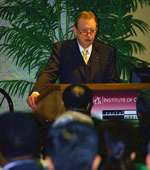Annual Racial Attitudes Study Released
 The majority of blacks and Hispanics believe they are treated “not very well” compared to whites, and both blacks and Hispanics report having been victims of unfair treatment in common situations during the past 30 days, according to data collected in UALR’s annual racial attitudes survey released today.
Year eight of UALR’s annual study, Racial Attitudes in Pulaski County, presents data collected by a telephone survey. This year’s survey focused on attitudes related to values, social conflict, and trust. This year, the survey of Pulaski Co. residents also included the Hispanic perspective.
UALR Chancellor Joel E. Anderson initiated the project in 2003, saying annual studies would provide the kind of research and data needed to improve black/white relations in Pulaski Co. – one of the biggest factors impacting the progress and future of the state.
Anderson hosted a morning conference in UALR’s Donaghey Student Center’s Ledbetter Hall for local leaders to discuss the findings. Marion Humphrey, retired Pulaski Co. Circuit Court judge; Vivian Flowers, director of recruitment for diversity at UAMS; and Maricella Garcia, director of Catholic Charities Immigration Services in Little Rock, participated in a reaction panel.
Other findings from this year’s report include:
The majority of blacks and Hispanics believe they are treated “not very well” compared to whites, and both blacks and Hispanics report having been victims of unfair treatment in common situations during the past 30 days, according to data collected in UALR’s annual racial attitudes survey released today.
Year eight of UALR’s annual study, Racial Attitudes in Pulaski County, presents data collected by a telephone survey. This year’s survey focused on attitudes related to values, social conflict, and trust. This year, the survey of Pulaski Co. residents also included the Hispanic perspective.
UALR Chancellor Joel E. Anderson initiated the project in 2003, saying annual studies would provide the kind of research and data needed to improve black/white relations in Pulaski Co. – one of the biggest factors impacting the progress and future of the state.
Anderson hosted a morning conference in UALR’s Donaghey Student Center’s Ledbetter Hall for local leaders to discuss the findings. Marion Humphrey, retired Pulaski Co. Circuit Court judge; Vivian Flowers, director of recruitment for diversity at UAMS; and Maricella Garcia, director of Catholic Charities Immigration Services in Little Rock, participated in a reaction panel.
Other findings from this year’s report include:
- Blacks, whites, and Hispanics are most likely to rate marriage as “very important” over any other value.
- Blacks and Hispanics are more likely than whites to say living a religious life or being wealthy is “very important.”
- Nearly three in four Hispanics say newcomers to the U.S. strengthen American customs and values.
- Blacks are more than three times as likely as Hispanics to say the president shares “a lot” of values with them.
- Blacks consistently perceive more social conflict and greater degrees of social conflict than whites and Hispanics.
- Blacks perceive lower levels of conflict between blacks and Hispanics than Hispanics do.
- Hispanics perceive fewer conflicts in their relationships with whites than they do in their relationships with blacks.
- Blacks perceive the greatest degree of conflict between the rich/poor, the young/old.
- Hispanics perceive the lowest degree of conflict between the rich/poor, the young/old and immigrants/those born in the United States.
- Blacks are most likely to identify themselves as Democrats, and Hispanics are most likely to identify themselves as Independent.
- Blacks and Hispanics are more likely than whites to believe opposition to Obama’s policies is due to racism.
- Blacks and Hispanics trust others to a lesser degree than whites.
- In general, whites from outside Little Rock trust others to a lesser degree than whites within Little Rock city limits.
- Blacks, whites, and Hispanics trust the people at their place of worship more than they do any other group of people.
- Blacks are the group least likely to trust their own racial/ethnic group “a lot.”
- The majority of blacks and Hispanics believe they are treated “not very well” compared to whites.
- Both blacks and Hispanics report having been victims of unfair treatment in common situations during the past 30 days.
- Approximately one-third of blacks, whites, and Hispanics say they had not interacted with friends of a different racial/ethnic group at home or outside the home during the last year.
- Blacks and whites engage in more social interaction with each other than they do with Hispanics.
View more stories in News
